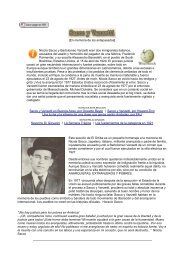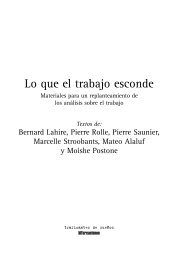The Invisible Man by H G Wells
The Invisible Man by H. G. Wells - Papeles de Sociedad.info
The Invisible Man by H. G. Wells - Papeles de Sociedad.info
You also want an ePaper? Increase the reach of your titles
YUMPU automatically turns print PDFs into web optimized ePapers that Google loves.
Indeed the theory of madness is almost unavoidable. Mr. Wicksteed was a man of forty-five or<br />
forty-six, steward to Lord Burdock, of inoffensive habits and appearance, the very last person in the<br />
world to provoke such a terrible antagonist. Against him it would seem the <strong>Invisible</strong> <strong>Man</strong> used an<br />
iron rod dragged from a broken piece of fence. He stopped this quiet man, going quietly home to his<br />
midday meal, attacked him, beat down his feeble defences, broke his arm, felled him, and smashed<br />
his head to a jelly.<br />
Of course, he must have dragged this rod out of the fencing before he met his victim—he must have<br />
been carrying it ready in his hand. Only two details beyond what has already been stated seem to<br />
bear on the matter. One is the circumstance that the gravel pit was not in Mr. Wicksteed's direct path<br />
home, but nearly a couple of hundred yards out of his way. <strong>The</strong> other is the assertion of a little girl<br />
to the effect that, going to her afternoon school, she saw the murdered man "trotting" in a peculiar<br />
manner across a field towards the gravel pit. Her pantomime of his action suggests a man pursuing<br />
something on the ground before him and striking at it ever and again with his walking-stick. She<br />
was the last person to see him alive. He passed out of her sight to his death, the struggle being<br />
hidden from her only <strong>by</strong> a clump of beech trees and a slight depression in the ground.<br />
Now this, to the present writer's mind at least, lifts the murder out of the realm of the absolutely<br />
wanton. We may imagine that Griffin had taken the rod as a weapon indeed, but without any<br />
deliberate intention of using it in murder. Wicksteed may then have come <strong>by</strong> and noticed this rod<br />
inexplicably moving through the air. Without any thought of the <strong>Invisible</strong> <strong>Man</strong>—for Port Burdock is<br />
ten miles away—he may have pursued it. It is quite conceivable that he may not even have heard of<br />
the <strong>Invisible</strong> <strong>Man</strong>. One can then imagine the <strong>Invisible</strong> <strong>Man</strong> making off—quietly in order to avoid<br />
discovering his presence in the neighbourhood, and Wicksteed, excited and curious, pursuing this<br />
unaccountably locomotive object—finally striking at it.<br />
No doubt the <strong>Invisible</strong> <strong>Man</strong> could easily have distanced his middle-aged pursuer under ordinary<br />
circumstances, but the position in which Wicksteed's body was found suggests that he had the ill<br />
luck to drive his quarry into a corner between a drift of stinging nettles and the gravel pit. To those<br />
who appreciate the extraordinary irascibility of the <strong>Invisible</strong> <strong>Man</strong>, the rest of the encounter will be<br />
easy to imagine.<br />
But this is pure hypothesis. <strong>The</strong> only undeniable facts—for stories of children are often unreliable—<br />
are the discovery of Wicksteed's body, done to death, and of the blood-stained iron rod flung among<br />
the nettles. <strong>The</strong> abandonment of the rod <strong>by</strong> Griffin, suggests that in the emotional excitement of the<br />
affair, the purpose for which he took it—if he had a purpose—was abandoned. He was certainly an<br />
intensely egotistical and unfeeling man, but the sight of his victim, his first victim, bloody and<br />
pitiful at his feet, may have released some long pent fountain of remorse which for a time may have<br />
flooded whatever scheme of action he had contrived.<br />
After the murder of Mr. Wicksteed, he would seem to have struck across the country towards the<br />
downland. <strong>The</strong>re is a story of a voice heard about sunset <strong>by</strong> a couple of men in a field near Fern<br />
Bottom. It was wailing and laughing, sobbing and groaning, and ever and again it shouted. It must<br />
have been queer hearing. It drove up across the middle of a clover field and died away towards the<br />
hills.<br />
That afternoon the <strong>Invisible</strong> <strong>Man</strong> must have learnt something of the rapid use Kemp had made of<br />
his confidences. He must have found houses locked and secured; he may have loitered about<br />
railway stations and prowled about inns, and no doubt he read the proclamations and realised<br />
something of the nature of the campaign against him. And as the evening advanced, the fields<br />
became dotted here and there with groups of three or four men, and noisy with the yelping of dogs.<br />
<strong>The</strong>se men-hunters had particular instructions in the case of an encounter as to the way they should<br />
support one another. But he avoided them all. We may understand something of his exasperation,<br />
and it could have been none the less because he himself had supplied the information that was being<br />
used so remorselessly against him. For that day at least he lost heart; for nearly twenty-four hours,<br />
save when he turned on Wicksteed, he was a hunted man. In the night, he must have eaten and slept;
















